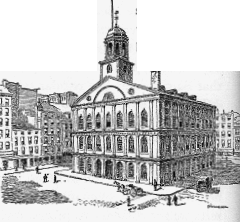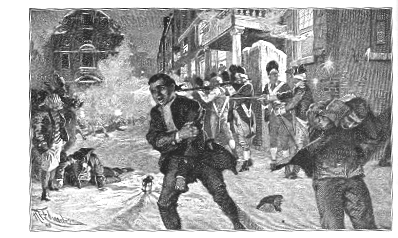Chapter 14 |

HOW THE OLD BAY COLONY LED THE VAN.
HERE were many things happening or getting ready to happen, in the year 1761, in Boston and inn the old Bay colony. That was the year in which news came that the young, slow witted, good-hearted, pig-headed, and bumptious George III. had become King of England and had declared that he would be king. That was the year in which brave, bold, impetuous, and fearless James Otis stood out as the people’s champion and openly declared :hat "kings were made for the good of the people, and not the people for them." That was the year in which, so John Adams always insisted, the story of the American Revolution began. That was the year in which this same John Adams’s sturdy cousin Sam was declaiming against the evils of foreign masters and the tyrannies of kings.A most remarkable, outspoken, clearheaded, masterful man was Samuel Adams of Boston. Born in that quaint little sea town in 1722, he had no head for business, but a great one for organization. And from his earliest boyhood he was American and rebel. |
|
119 In the year 1740, when he was about eighteen years old, he took part in the commencement exercises at Harvard College and had this as the topic of his oration:Is it lawful to resist the supreme magistrate if the commonwealth cannot otherwise be preserved?" "Must assuredly it is right and lawful," the boy declared; and he pleaded his case so earnestly and eloquently that even aristocratic, king-worshiping Governor, Shirley voted to give him his degree, while the college boys who applauded him said to one another, "Why, that Sam Adams is a regular rebel, isn’t he?" He was indeed a rebel to anything like tyranny. When he saw that the English government was only interested in the colonies for what it could force from them for the personal profit of that motherland of England which he felt to be no true or devoted mother, he stirred up his fellow-citizens of Boston, of Massachusetts, and of America to protest and to rebel. He urged the various town meetings of the Bay colony to assert their rights and demand recognition; he drafted the protest against taxation without representation sent over the sea to England; he advocated the first Continental Congress; he issued the circular letter which Massachusetts sent to the other colonies urging unity of action; he was fearless, sincere, unyielding, and absolutely incorruptible. He organized revolution. British gold could not bribe him; British steel could not kill him; he, more than any other man, led Massachusetts into rebellion and America into revolution; and as the bronze tablet, set in the wall of the big building that stands on the site of his Boston home, assures the world, this |

120
same Samuel Adams was, in truth, the "Father of the Revolution." If, as John Adams said, independence was born in the old townhouse when James Otis made his famous speech, it was rocked into health and strength in that ever famous Faneuil Hall. which Otis called the "cradle of liberty," because there Samuel Adams nursed America into that made a mighty nation. Three standing in Boston. may rightly be regarded as the primary schools of revolution—the old Statehouse, Faneuil Hall, and the Old South Meetinghouse, in each which Sam Adams, the leader of the people, spoke the ringing words that led to liberty.Under the inspiration of James Otis and the leadership of Samuel Adams things in the Old Bay colony began o look very bad for the king’s cause. Parliament tried to raise money by taxes and restrictions; these the colony would neither pay nor per-nit. From criticism to protest, to refusal, to rebellion, he spirit of opposition passed, and at last the precepts hat Samuel Adams preached, the people of Massachusetts practiced, when opposition culminated in those two famous historic events, the Boston Massacre and the Boston Tea Party.
|
|
121 The first of these disturbances came because the people of Boston objected to having soldiers, who were to force the colony into submission, thrust upon a free colony as unwelcome guests; the second came because the people of Massachusetts determined not to receive an article unjustly urged upon them to their own disadvantage. For the protection of the province, which the colonists neither desired nor required, King George proposed to garrison the town with his redcoats, and thus, under cover of protection, overawe the people into doing what he said they must. But the people had been free from these red-coated good-for-nothings too long to submit tamely to their presence. So the relations between soldiers and citizens became strained. The boys of the town, ever ready for a lark, and the lawless class, never friendly to uniformed authority, began to plague and pester the redcoats. The soldiers retaliated; and one day on King (now State) Street, one of the garrison struck a boy, who, no doubt, had worried him into retaliation.It was the spark that set the tinder alight. The boy stirred up other boys; the workingmen and the restless element joined forces; and boys and men alike gathered about the gate of the main guardhouse, opposite the south door of the townhouse (or old Statehouse, as we call it), and began to jeer at the soldiers as they passed between the guardhouse and their barracks. The soldiers threatened the crowd, and the crowd flung back taunts; the alarm bell began to ring; more |
|
122 curious ones joined the crowd. One of the officers ordered the soldiers into the guardhouse and slammed the gate against the crowd. Only a sentinel remained outside. "That’s the lobster that struck me! " cried a boy in the crowd, pointing at the sentinel and using the nickname that the street boys gave the hated redcoats. It was the boy who had already got himself into trouble. "Why don’t he take one of his size? He knocked me down with the butt end of his musket.""Ah, the coward! Pitch him over! Knock him down! " yelled the crowd.The sentinel drew back and began to load his gun. "Look out! he’s going to fire," shouted the boy. "Don’t you dare fire," young Henry Knox, a bookseller’s clerk with a famous future before him, called out to the redcoat. " If you do they’ll kill you.""I don’t care," said the sentry. "If they touch me I’ll shoot ‘em." It was the evening of March 5, 1770. There was a little snow on the ground, and the boys began to snowball the sentry and call him names. Then something harder than a snowball hit him. This made him angry, and may have scared him a bit, too,—one man alone against a crowd. "Help! Corporal of the guard! Help! They’re hitting me!" he shouted. " Turn out! turn out!The gates of the main guardhouse swung open, and a sergeant with seven men hurried out. "Prime and load! " the sergeant commanded, and the guns were loaded. |
|
123 Then Captain Preston joined his men, and the eight soldiers with loaded muskets faced a howling mob of sixty or seventy men and boys. The boys made themselves very much in evidence. They danced and pranced in front of the soldiers, mocking and baiting them. "Yah, lobsters! " they cried. "Fire if you dare! You dar’sn’t!Then the men joined the boys in their dare. "Put down your guns, you cowards, and meet us even," they called out. "We’re not afraid of you! The soldiers .lowered their bayonets for a charge; the crowd swung their clubs; Captain Preston, in a rage, sprang at the crowd and bade them be gone. "Yah, lobsters! lobsters! bloody-backs! why don’t you fire? Fire if you dare! " cried the mob, gathering about their self-constituted leader, Crispus Attucks, half Indian, half negro."Send your men back, captain," shouted young Henry Knox. "It will be worse for you if you don’t." "You let me alone. I know what I’m about," retorted the angry captain. But evidently he did not. For in his excitement he either told his soldiers to shoot, or they thought he did, and suddenly, bang went a gun! bang, bang, went another and yet another, until the seven guns had all been fired and here and there in the mob men had fallen, dead or dying—Crispus Attucks and Samuel Gray and James Caldwell, dead; Samuel Maverick and James Carr, dying. The mob broke and scattered; then as Captain Pres- |

"Tear down the guardhouse! " they cried. "Murderers! murderers! " they shouted.Alarm. bells rang; the drums of the garrison beat to arms; the town drums followed suit; people and soldiers were equally excited. The streets were filled with a surging crowd. The Revolution had begun. "opposite this spot," so runs a tablet set in the front of a granite building on the corner of State and Exchange streets, "the first blood of the Revolution was shed." And Boston always observed the 5th of March, the anniversary of the Boston Massacre, until the 4th of July became the nation’s anniversary day, after the close of the American Revolution. It was authority against lawlessness. It was the soldiers against a mob. But the British authorities had |
|
125 brought the trouble upon themselves. There was no cause for sending soldiers to Boston; but they were sent; and the lawful protests of the people ended at last in an unlawful mob, in riot and massacre, for which England alone was to blame. Again the people demanded the withdrawal of the troops. An indignation meeting was held in Faneuil Hall. Sam Adams, John Hancock, and a dozen other leading citizens went to the governor and demanded that the regiments be at once sent away from the town. Another indignation meeting was held in the Old South Meetinghouse. The governor promised to have one regiment withdrawn. "Both regiments or none! " Samuel Adams demanded, and the crowd within and without the Old South echoed his cry. A committee of safety was formed; the whole town turned out to the public funeral of the victims of the massacre; Captain Preston and his soldiers were arrested land put on trial for murder. But Massachusetts never allowed passion to override justice. When the British captain was tried, John Adams and Josiah Quincy, leaders among the Massachusetts patriots, appeared in court as his lawyers, so that justice might be done and the captain and his men have a fair trial. They did have one, and they were acquitted, although two of the soldiers were lightly punished for manslaughter. For the trial showed that the mob had goaded on the soldiers to what they thought was self-defense; and so the trouble, for the time, passed over. But the troops |
|
126 were withdrawn, and King George, disgusted with the whole affair, always referred to those unlucky redcoats as "Sam Adams’s regiments." On the very day of the Boston Massacre the British Parliament insisted that the American colonies must pay the tax on tea. You know the trouble that followed, and how, when Sam Adams in the Old South Meetinghouse declared, "This meeting can do nothing more to save the country," the hated taxed tea was swiftly dumped overboard from the ships in Boston harbor by patriotic "Sons of liberty" dressed up as Indians; and how the first paragraph in the story of the American Revolution—the Boston Massacre, Monday, March 5, 1770—was followed by the second paragraph—the famous Boston Tea Party of Thursday, December 16, 1773.Thus did Massachusetts reply to the stupidities and usurpations of the King of England. Thus did the Old Bay colony lead the van in the struggle for independence, and thus did Samuel Adams, the man of the people, go down into history as the organizer of overthrow,—the "Father of the American Revolution." |